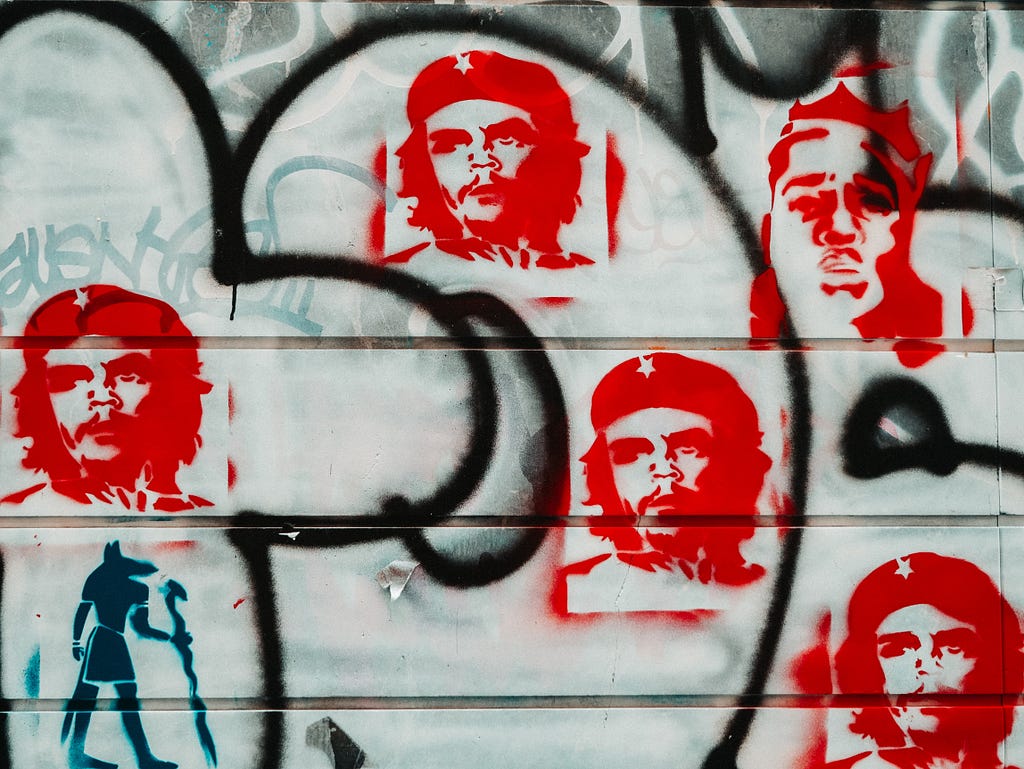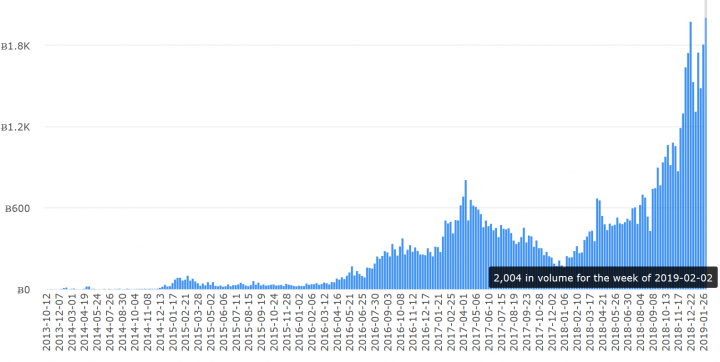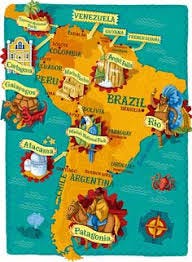Latest news about Bitcoin and all cryptocurrencies. Your daily crypto news habit.
 Photo by Matt Seymour on UnsplashThe full-scale adoption of cryptocurrency is a slow process. It will take time. But when it happens, it is sure to revolutionize the world of finance and business. This is sadly too late for a lot of Latin America, and especially for Venezuela, which sees itself plummeting to greater political and fiscal depths as we speak.
Photo by Matt Seymour on UnsplashThe full-scale adoption of cryptocurrency is a slow process. It will take time. But when it happens, it is sure to revolutionize the world of finance and business. This is sadly too late for a lot of Latin America, and especially for Venezuela, which sees itself plummeting to greater political and fiscal depths as we speak.New Dawn
Like all new dawns, there comes a time for change. In the developing world and Third World — Africa and Asia notwithstanding — access to banking structures in the traditional model, as well as other modern financial systems, has always been hard to come by. Latin America is no exception to the rule. The popularity of the internet over the last two decades and the way it has been adopted wholeheartedly in Central and South America has seen a surge in interest of alternative ways to transfer money and save it. From the 25 million internet users worldwide half a century ago to over 3 billion in 2019, it is no surprise that just over 32 million bitcoin wallets have been set up around the world by December 2018 and approximately seven million active bitcoin users.
While Bitcoin users don’t seem a huge number on a global scale, it does show that the popularity of this — and other cryptocurrencies — is rising.
In Latin American countries, where the economies are developing at a steady pace, cryptocurrencies are offering users a framework that is independent of the fiscal constraints of their countries that, though not always the case, are often governed by nepotistic, corrupt politicians which more often than not suffer the degradation of inflationary economics.
Free from the shackles of despotism at last, then?
Not quite, but it’s getting there.
‘Latin America is very volatile. Cryptos are turning into a new haven for these families.’
— Carlos Mosquera, founder of hedge the fund Solidus Capital
Bitcoin Takes Control
The 600 million people that make up South and Central American are ripe for change. Nearly a quarter of them possess mobile phones and other devices. Sadly, only 40 percent of this number have banking services available to them.
This is where Bitcoin can take control.
More so than Europe or the United States — which both have well-established, trusted fiat currency banking systems — Latin America is the ideal candidate for Bitcoin and alternative cryptocurrencies to take hold on the market and become the bona fide substitute — or even replacement — financial system on the respective continents in the years to come.
Brazil and Argentina are among the early adopters of cryptocurrencies, with Buenos Aires, the capital of Argentina, listed in the top ten cities in the world for the use of Bitcoin.
In the real economic context, Bitcoin constitutes a quantum leap in a technological and economic sense. Foreign remittances — the scourge (or should I say saving grace) of many poorer Latin Americans working in the United States or the richer Latin American countries like Chile and Mexico in order to send money home with the inflationary and services charges taking a big chunk of their money, would be a thing of the past with Bitcoin. It would also act as a replacement to local currencies where inflation, more often than not, goes up and down at a whim, and would give the poorer citizens more financial stability.
Bitcoin would also be good for small businesses and entrepreneurs in Latin America, bypassing the aggravations of local bureaucrats requiring kickbacks in hard currency. With Bitcoin, the world’s their oyster, opening up potential investments around the world as customers break away from the need to pay costly transaction fees for cross-border business transfers.
The inbound remittance level of Latin America was $80.5 billion in 2017. A large chunk of this was taken by fees and the fluctuation in exchange rates. Bitcoin will solve all these problems, adding a fortune to the economies of these countries with mass scale adoption.
Further, there are at least half a dozen nations in Latin America which suffer the ignominy of hyperinflation and rigid currency regulations. By adopting Bitcoin, countries can sustain economic independence, aiding their path to development.
Venezuela’s Case
Already we can see such a case in Venezuela, which since the death of President Hugo Chavez in 2013, has seen one economic disaster after another. Currently, Chavez’s successor, Nicolás Maduro, is fighting for his political life against young pretender, Juan Guaidó, president of the National Assembly of Venezuela, and acting president since January 2019.
‘Many Venezuelans are using Bitcoin to convert their bolivars, which are being permanently devalued by hyperinflation, to keep something of value’
— Asdrubal Oliveros, an economist at Caracas-based consultancy Econanalitica.
Here, Bitcoin could do wonders, though presently it is only wealthier Venezuelans who have been using Bitcoin for things like savings and remittances, not to mention for foreign currency exchange, as the bolivar is practically valueless. Startups, too, are beginning to use the digital currency in the hope of avoiding headaches when dealing in fiat currencies. The reality is, sadly, the majority of people in the country are still using the inflation-riddled national currency, as most find it difficult to get their heads around and manipulate the digital wallets of cryptocurrencies within the country.
 A peer-to-peer bitcoin marketplace, volume (in bitcoin) in Venezuela: Source: Coin.dance
A peer-to-peer bitcoin marketplace, volume (in bitcoin) in Venezuela: Source: Coin.dance
With the inflation rate set to hit 10,000,000% this year, most Venezuelans see the bolivar as useless but need it as they have no other options financially. Countless economic migrants are forced to smuggle American dollars and food back across the border from Colombia after working there, hiding it in their hair and other hard-to-find places. This is a risky endeavour: if caught, many of these people are threatened with beatings by the national guard.
Such a state of affairs would, in theory at least, see the widespread adoption of cryptocurrencies as the best way to go. Yet many outside the country don’t see the full picture: buying routine essentials like food and medicine can’t be bought with Bitcoin. Businesses and merchants selling things with more value, nevertheless, it is possible. So, if you want to purchase a car or some high-tech electronic gadgetry, the chances of buying it in Caracas is fair to high. But the majority of Venezuelans’ needs are far more mundane: a loaf of bread or a bunch of bananas is as good as is gets.
 Hugo Chavez, former president of Venezuela. Source: cartoonstock.com
Hugo Chavez, former president of Venezuela. Source: cartoonstock.com
To save Venezuela from its political malady is going to take more than Bitcoin, however. Attitudes within the country and in Latin America as a whole will have to change. First of all, the demographic between the banked and the unbanked needs to balance out. Only Brazil has a larger proportion of its population banked rather than unbanked, which is a sad state of affairs. And the financial institutions, both state-owned and privately run, too, have no incentive to change the gargantuan unbanked populations in their countries.
‘Latin America is very fond of the word ‘hope.’ We like to be called the ‘continent of hope.’ Candidates for deputy, senator, president, call themselves ‘candidates of hope.’ This hope is really something like a promise of heaven, an IOU whose payment is always being put off. It is put off until the next legislative campaign, until next year, until the next century.’
— Pablo Neruda
But with all this terrible news, let us have hope. Bitcoin and cryptocurrencies are still in their infancy. The fully-fledged use of them — not just in Latin America but also around the world — is just beginning. And we pray, by hook or by crook, in the future this type of digital currency will, at least in some instances, help countries like Venezuela deal with their financial and political woes.
Love in the Time of Bitcoin: Latin America and Cryptocurrency was originally published in Hacker Noon on Medium, where people are continuing the conversation by highlighting and responding to this story.
Disclaimer
The views and opinions expressed in this article are solely those of the authors and do not reflect the views of Bitcoin Insider. Every investment and trading move involves risk - this is especially true for cryptocurrencies given their volatility. We strongly advise our readers to conduct their own research when making a decision.
